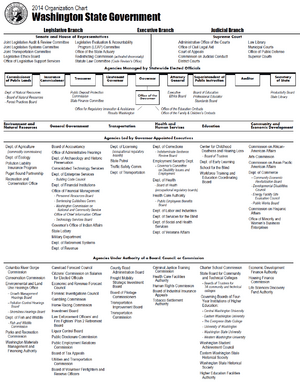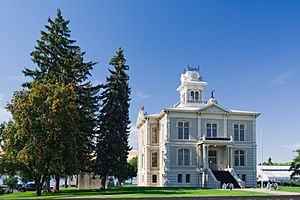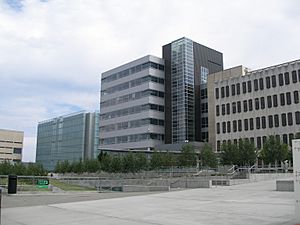Government of Washington (state) facts for kids
The government of Washington State is how the state of Washington in the United States is run. It's all set up by the Washington State Constitution. This government has three main parts: the executive, the legislative, and the judicial branches. There are also local governments for counties, cities, and special districts.
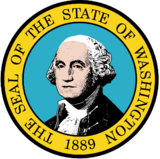
|
|
| Polity type | Presidential republic Federated state |
|---|---|
| Constitution | Constitution of Washington |
| Legislative branch | |
| Name | Legislature |
| Type | Bicameral |
| Meeting place | Washington State Capitol |
| Upper house | |
| Name | Senate |
| Presiding officer | Denny Heck, President |
| Lower house | |
| Name | House of Representatives |
| Presiding officer | Laurie Jinkins, Speaker |
| Executive branch | |
| Head of State and Government | |
| Title | Governor |
| Currently | Bob Ferguson |
| Appointer | Election |
| Cabinet | |
| Name | Cabinet |
| Leader | Governor |
| Deputy leader | Lieutenant Governor |
| Headquarters | Washington State Capitol |
| Judicial branch | |
| Name | Judiciary of Washington |
| Courts | Courts of Washington |
| Supreme Court | |
| Chief judge | Debra L. Stephens |
| Seat | Temple of Justice, Olympia |
Contents
The Executive Branch: Leading Washington State
The executive branch is like the management team of Washington State. It's called a "plural executive" because many of its top leaders are chosen by voters, not just appointed by the Governor.
Who are Washington's Elected Leaders?
Besides the Governor, other important state leaders are elected by the people. These include:
- The Lieutenant Governor
- The Attorney General (the state's top lawyer)
- The Secretary of State (manages elections and records)
- The Treasurer (manages state money)
- The Auditor (checks how state money is spent)
- The Commissioner of Public Lands (manages state lands)
- The Superintendent of Public Instruction (leads public schools)
- The Insurance Commissioner (oversees insurance companies)
These officials are usually elected for four-year terms. The Superintendent of Public Instruction is the only one elected without a political party label.
What Does the Governor Do?
The Governor is the head of the executive branch. They have many important jobs, like:
- Approving or rejecting new laws.
- Granting pardons (forgiving crimes).
- Leading the state's military forces.
- Appointing leaders for many state departments.
The current Governor is Bob Ferguson. Other current leaders include Denny Heck as Lieutenant Governor and Chris Reykdal as Superintendent of Public Instruction.
Key State Departments
Many state departments help the executive branch do its work. Some of the main ones are:
- Agriculture (WSDA) - Helps farmers and food safety.
- Corrections (DOC) - Manages prisons.
- Ecology (ECY) - Protects the environment.
- Health (DOH) - Works on public health.
- Licensing (DOL) - Handles things like driver's licenses.
- Natural Resources (DNR) - Manages state forests and lands.
- Transportation (WSDOT) - Manages roads, ferries, and transit.
The Washington State Register is a publication that lists government activities. The Washington Administrative Code (WAC) is a collection of all the state's rules and regulations.
The Legislative Branch: Making Laws
The Washington State Legislature is the part of government that creates laws for the state. It has two parts, making it "bicameral" (meaning "two chambers").
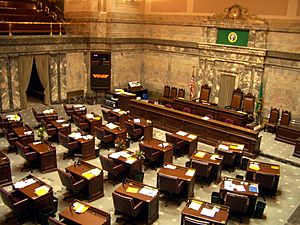
How the Legislature is Organized
The two parts of the Legislature are:
- The House of Representatives (the lower house).
- The State Senate (the upper house).
Washington State is divided into 49 areas called legislative districts. Each district elects two representatives for the House and one senator for the Senate. Representatives serve for two years, while senators serve for four years. There are no limits on how many terms they can serve.
Leaders in the Legislature
The leader of the House of Representatives is called the Speaker of the House. The Speaker helps control which laws are discussed and voted on.
In the Senate, the Lieutenant Governor acts as the President of the Senate. They only vote if there's a tie. The Senate also has a President Pro Tempore who leads when the Lieutenant Governor isn't there. Other leaders, like the majority and minority leaders, are chosen by their political parties.
New laws passed by the Legislature are published in the Laws of Washington. These laws are then organized into the Revised Code of Washington (RCW).
The Judicial Branch: Interpreting Laws
The judicial branch is made up of the state's courts. Their job is to explain what the laws mean and to make sure they are followed fairly.
Washington's Court System
Washington has different levels of courts:
- Supreme Court: This is the highest court in Washington. It has nine justices (judges) who are elected for six-year terms. They hear important cases, especially those about the state constitution or laws that might be unconstitutional. They also review all cases where the death penalty was given.
- Court of Appeals: This court handles appeals from lower courts. If someone thinks a decision in a lower court was wrong, they can ask the Court of Appeals to review it. Judges here are also elected for six-year terms.
- Superior Courts: These are the main trial courts. They handle serious criminal cases, major civil lawsuits, and family matters. Washington has 30 Superior Court districts. Judges are elected for four-year terms.
- District Courts and Municipal Courts: These are local courts that handle less serious cases. They deal with minor crimes (misdemeanors), traffic tickets, small civil lawsuits, and small claims. Judges are elected or appointed for four-year terms.
The Washington State Bar Association (WSBA) is in charge of licensing and regulating lawyers in the state. There's also a Commission on Judicial Conduct that looks into complaints against judges.
Local Government: Serving Communities
Besides the state government, Washington also has local governments that serve specific areas.
Counties and Cities
- Counties: Washington has many counties. Most are run by a group of three to five county commissioners. Some larger counties might have a different setup, like a county council and an elected executive.
- Cities and Towns: Cities and towns can have different ways of governing, such as a mayor-council system (where the mayor is the chief executive) or a council-manager system (where a city manager runs daily operations).
Special Purpose Districts
These are local governments that provide specific services that cities or counties might not offer. They can manage things like:
- Electricity
- Fire protection
- Parks and recreation
- Libraries
- Water and sewer services
- Even stadiums or convention centers!
See also
- Elections in Washington (state)
- Law of Washington (state)


